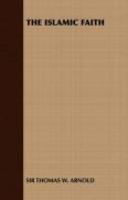
Book Summary
THE ISLAMIC FAITH - 1928 - CONTENTS - THE CREED OF ISLAM - THE faith of Islam is professed by about 239 millions of persons, distribute mainly throughout the continents of Asia and Africa, but found also in smaller groups in many other parts of the world. Their creed is expressed in the brief sentence There is no god save God Muhammad is the Apostle of God. Around these two central dogmas of the Unity of God and the prophetic mission of Muhammad, the whole of Muslim theology has been built up, and whatever may have been the variations in the exposition of religious doctrine and the diversities of ecclesiastical organization, all the sects and they have been many a ree in the acceptance of these fundamental articles o f the faith and repeat the creed in the same words. It is whispered in the ear of the new-born babe it is one of the first sentences the growing child is taught to utter on all possible occasions, the pious Muslim loves to repeat it, and these should be the last words on the lips of the dying. The two parts of which this creed are made up, nowhere occur together in the Qurin, but are taken from separate chapters-viz., xlvii., 21, and xlviii., 29. The im lications of the first clause are that God is One a n i Unique in His essence the qualities of the divine nature are, indeed, enumerated at great len th in the QurLn, but throughout the whole of Muskn theological literature the heresy most dreaded is at of Shirk, or giving to God a partner, and the exposition of the Being of God is set forth in such a way as always to emphasize His absolute Unity. A large part of the dogmatic theology of the Muslim world is taken up with the problem of the relation between the essence ofGods nature and His qualities, such as His power, knowledge, and goodness, etc., as will be shown later on. The second article of this creed implies a doctrine of Gods relation to His creation, according to which God, having first instructed Adam in divine truth and explained to him his duties, in succeeding ages, as the knowledge of this truth became obscured, and men lapsed into unbelief, sent a succession of prophets-Noah, Abraham, Moses, etc.-to proclaim anew the primitive revelation. This series of prophets comprises many of the familiar names of the Old Testament, and leads through St. John the Baptist and Jesus to Muhammad, the seal of the rophets, after whom no further inspired teacher is he f d to be needed. According to this theory of Gods revelation to men through prophets, Muhammad was not the founder of any new religion, and he constantly emphasized the fact that he was an apostle of no new doctrine Quran, xlvi., 8, and described his own teaching as being the religion of Abraham. It is, therefore, misleading to call the Muslim faith Muhammadanism, as though the adherents of it considered Muhammad to be the founder of it, and the name which the Muhammadan world gives to its own faith is Islam-that is, resignation to the will of God. Thus, by theory, there is nothing new in Muhammads teaching, and in the Quran he represents himself as bidden by God to ay We believe in God and in what hath been sent down to us and what hath been sent down to Abraham and Ishmael and Isaac and Jacob and the tribes, and in what was given to Moses and to Jesus and to the rophets from their Lord...
Book Details
| Book Name | The Islamic Faith |
| Author | Thomas W. Arnold Sir Thomas W. Arnold |
| Publisher | Kiefer Press (Oct 2007) |
| ISBN | 9781408631386 |
| Pages | 84 |
| Language | English |
| Price | 1244 |








